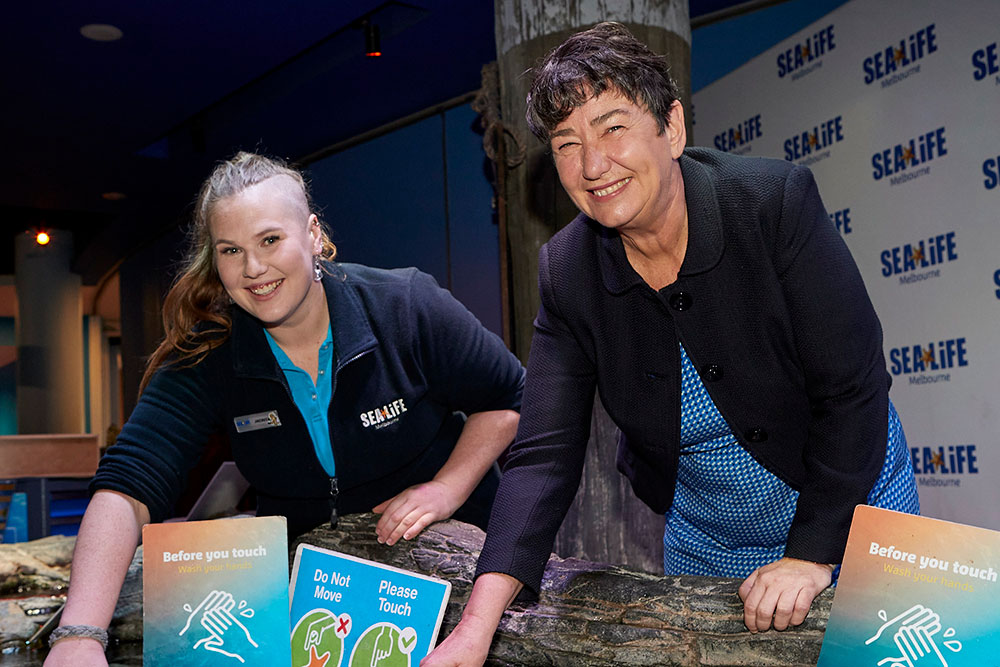SEA LIFE Melbourne Aquarium and Agriculture Victoria
Together, SEA LIFE Melbourne Aquarium and Agriculture Victoria have made a significant contribution to reducing aquatic biosecurity risks through their Junior Marine Biosecurity Officer program. Launched in May 2024, the month-long initiative aimed to raise awareness about the importance of protecting marine ecosystems and preventing the spread of marine pests.
The program targeted school-aged children and provided visitors with an immersive and innovative educational experience. Through dedicated exhibits and activities, participants learned about the critical role of biosecurity in safeguarding marine biodiversity.
As part of the program, visitors were lead along a trail, keeping an eye and ear out for information about invasive marine pests along the way. They also learnt about ways in which invasive marine species can be introduced into Victoria and how they can impact native ecosystems. The program sought to educate audiences on high-risk invasive species and how to report them, to ensure we all help protect Australia’s marine environments. Once they completed an activity book, participants received a Junior Marine Biosecurity Officer certificate.
Marine pests can cause significant harm to Australia’s marine environment. These pests can include a wide range of organisms, from microscopic algae to various species of sea stars, sea squirts, mussels and crabs.
Enhancing environmental biosecurity efforts helps to conserve, restore and care for Australia’s sea and aquatic ecosystems, protect native species and support biodiversity. Agriculture Victoria, as the state’s lead agency for marine biosecurity, works to promote marine biosecurity issues through engaging with other jurisdictions, industry and the community. Through these initiatives, Agriculture Victoria aims to minimise the risks of new incursions and to maximise protection from biosecurity risks.
SEA LIFE is the world’s largest family of aquariums. Conservation of marine life is at the heart of the SEA LIFE Conservation, Welfare and Engagement (CWE) team’s work. Their goal is to inspire guests to fall in love with Australia’s oceans and protect marine life. To do this, SEA LIFE experts look at new ways in which creatures, display techniques and technology can create the most engaging and enlightening experiences. They also promote conservation and welfare work.
The collaboration between SEA LIFE Melbourne Aquarium and Agriculture Victoria is the first of its kind to be championed in Australia. Building on the expertise within both organisations for marine biosecurity risk and education, the program has raised the awareness of marine biosecurity issues and fostered a sense of shared responsibility with thousands of school-aged children and the public more broadly.
Thousands of participants have followed the marine biosecurity trail at the aquarium with more than 5,000 Marine Pest Activity Books handed out to the next generation of marine biosecurity heroes.
Following the programs’ huge success, SEA LIFE’s parent company, Merlin Entertainment, is developing a similar program for its Mooloolaba and Sydney sites in collaboration with Biosecurity Queensland and the New South Wales Department of Primary Industries.
SEA LIFE Melbourne Aquarium and Agriculture Victoria was nominated by Luke Barron from Aquatic Biosecurity, New South Wales Department of Primary Industries.
Watch a video about their work
Introduction
This is the accessible text transcript of a 2024 Australian Biosecurity Awards winner video featuring Jacinta Early, Beth Evans and Gabriela Martinez Ortiz.
Transcript
Jacinta Early: Hi, my name is Jacinta Early. I am the education supervisor and aquarist here at SEA LIFE Melbourne.
Beth Evans: Hi, I'm Beth Evans, I'm project officer, invasive marine species at Agriculture Victoria.
Gabriela Martinez Ortiz: And I'm Gabriela Martinez Ortiz, former project officer, in invasive marine species at Agriculture Victoria.
Jacinta Early: We are thrilled to accept the Australian Biosecurity Award in Education for our Junior Marine Biosecurity Officer program that was rolled out here at SEA LIFE Melbourne, in conjunction with Agriculture Victoria.
Jacinta Early: We understand the importance of protecting our beautiful oceans, especially down here in our southern oceans, as well as making sure people understand the impacts that invasive species have to our native species as well. When they came into the doors, over four and a half thousand kids were able to experience the program by identifying different invasive species that can be found here, learning how to identify, sample them, and also be able to pet some invasives as well.
Jacinta Early: We are thrilled to have this acknowledgment, and we are so excited to potentially even roll this out across SEA LIFEs in Australia, New Zealand and even globally.
Beth Evans: A big thank you to Luke Barron at New South Wales Department of Primary Industries and Regional Development. Thank you so much for nominating us for this award. We are so excited and feel honoured to receive this.
Gabriela Martinez Ortiz: Another big honour to Louise Cleary and her team at Biosecurity Strategy Unit. And Richard Stafford-Bell, principal officer, invasive marine species, and all their help in making this program a reality.
Beth Evans: Please remember, if you see anything unusual, please report it to Agriculture Victoria. Thank you so much. Thank you. Thank you.




